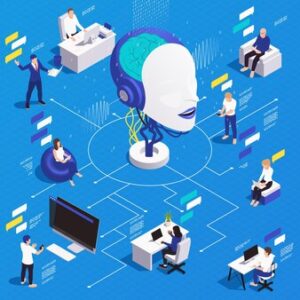Artificial intelligence (AI) is rapidly transforming the workplace, automating tasks, creating new jobs, and changing the way we work. While some people may be concerned about the impact of AI on jobs, it is important to remember that AI is also creating new opportunities for workers and businesses alike.

How is AI Changing the Way We Work?
AI is changing the way we work in a number of ways. First, AI is automating many routine and repetitive tasks, freeing up workers to focus on more complex and creative work. For example, AI-powered chatbots are now handling customer service inquiries, and AI-powered software is automating tasks such as data entry and accounting.
Second, AI is augmenting human capabilities, helping us to work more efficiently and effectively. For example, AI-powered tools can help us to identify patterns in data, make predictions, and generate new ideas. AI can also be used to personalize our work experiences and provide us with real-time feedback.
Third, AI is creating new jobs and industries. For example, there is a growing demand for workers with skills in AI development, machine learning, and data science. There are also new job opportunities in fields such as AI-powered marketing, sales, and customer service.
What Jobs are Being Automated?

The jobs that are most at risk of being automated are those that are repetitive, routine, and rule-based. These jobs can be easily performed by AI-powered systems, which are often more efficient and accurate than humans.
Some examples of jobs that are being automated include:
Data entry clerks
Cashiers
Factory workers
Customer service representatives
Accountants
Truck drivers
What New Jobs are Being Created?
While AI is automating some jobs, it is also creating new jobs in fields such as AI development, AI maintenance, and AI support. These jobs require workers to have the skills and knowledge to design, develop, and deploy AI systems.
Some examples of new jobs that are being created by AI include:
AI engineers
AI scientists
AI data scientists
AI trainers
AI ethicists
How Can Workers Prepare for the Future of Work in an AI-Powered World?

To prepare for the future of work in an AI-powered world, workers need to focus on developing skills that are complementary to AI. These skills include:
Develop skills in AI, machine learning, and data science.
Focus on developing human skills such as creativity, problem-solving, and critical thinking.
Become lifelong learners and be willing to adapt to new technologies and ways of working.
Network with other professionals and learn from their experiences.
Workers should also be open to learning new skills and retraining as needed. The future of work is likely to be characterized by rapid change, so workers need to be prepared to adapt.
Tips for Employers
Employers can also play a role in helping workers prepare for the future of work in an AI-powered world. Employers can:
Identify your transferable skills. Even if your job is automated, there are likely skills that you can transfer to a new role. For example, if you work in customer service, you may have strong communication and interpersonal skills. These skills would be valuable in a variety of other roles, such as sales or marketing.
Develop new skills. As mentioned above, there is a growing demand for workers with skills in AI, machine learning, and data science. If you are interested in pursuing a career in AI, there are a number of online courses and bootcamps that can teach you the skills you need.
Network with people in AI. One of the best ways to learn about AI and find new job opportunities is to network with people who are already working in the field. Attend industry events, connect with people on LinkedIn, and reach out to people you admire.
Be flexible and adaptable. The world of work is changing rapidly, so it is important to be flexible and adaptable. Be willing to learn new skills, take on new challenges, and move to new cities or countries if necessary.
Conclusion

AI is transforming the workplace in a number of ways. It is automating tasks, creating new jobs, and changing the way we work. Workers can prepare for the future of work in an AI-powered world by developing skills in AI, machine learning, and data science; focusing on developing human skills such as creativity, problem-solving, and critical thinking; becoming lifelong learners; and networking with other professionals.
Additional information
Here are some additional resources that may be helpful for workers who are preparing for the future of work in an AI-powered world:
World Economic Forum: The Future of Jobs Report
McKinsey Global Institute: The Future of Work
Gartner: Top 10 Strategic Technology Trends for 2023
Coursera: AI for Everyone Specialization
Udacity: Machine Learning Engineer Nanodegree
LinkedIn Learning: AI Fundamentals
Meetup: AI Meetups
If you have thoughts to share, questions to ask, or if there’s a specific topic you’d like us to cover in the future, please don’t hesitate to reach out. Your feedback and engagement drive us forward.
Until next time, keep learning, keep innovating, and keep pushing the boundaries of what’s possible.

